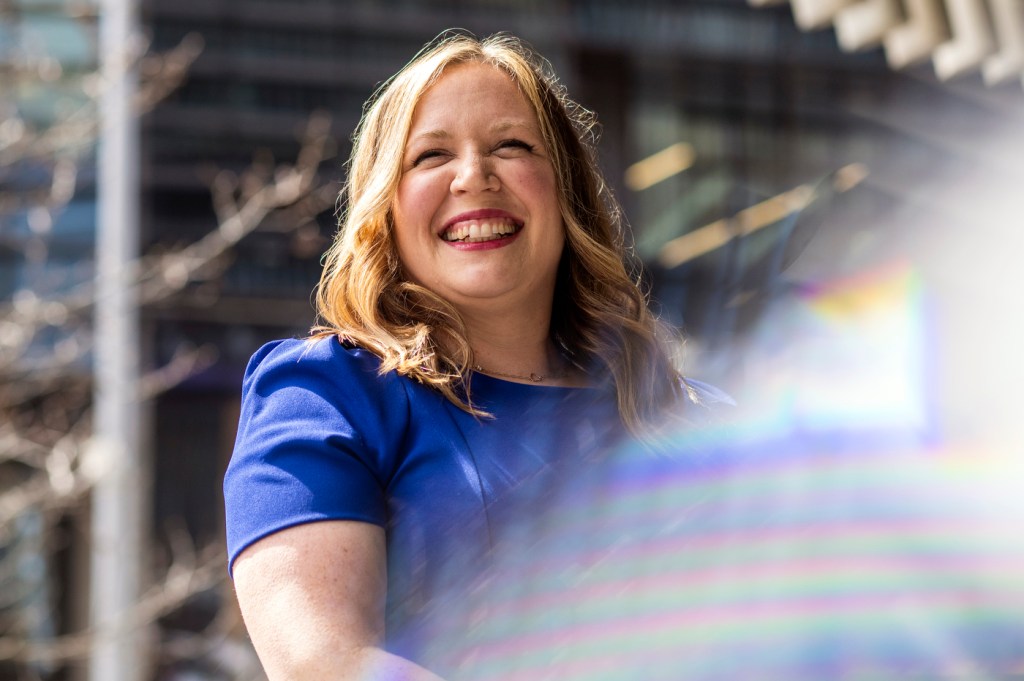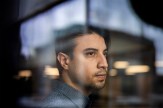‘You have the power to make change.’ Sustainability trips to Brazil earn professor Northeastern’s first global educator award

It began 11 years ago when Courtney Pfluger, a new professor at Northeastern, discovered that 80% of Brazil’s energy grid was drawn from sustainable sources—compared to 10% in the U.S. at that time. One step of inquiry after another led the associate teaching professor and a cohort of engineering students on the first of many Dialogue of Civilizations expeditions to Brazil.
One decade into her ambitious journey, Pfluger has been honored with Northeastern’s inaugural global educator award.
“I’m really passionate about sustainability and teaching the students that they have a role in the world’s future,” Pfluger says. “I tell the students that I want to help empower you, that you don’t have to sit around while you watch all of these things happen in our society and feel helpless. You have the power to make change.”
Pfluger’s work to advance global experiential learning stood out among a field of highly qualified candidates from across the university, said Ken Henderson, chancellor and senior vice president for learning at Northeastern.
“Professor Pfluger’s passion lies in teaching engineers to examine global sustainability issues through local, global and cultural lenses,” Henderson says. “It was her work on developing meaningful cooperative partner projects that made her nomination stand out.”
Pfluger has led students on nine Dialogue of Civilizations visits to Brazil since 2013. A traveling party of 16 to 24 students lives, learns and works together in Brazil for more than five weeks while focusing on sustainability issues.
“Among engineers, including me with my chemical engineering background, there is a focus on innovation and doing new things, but a lot of times it has to do with the design and the technical know-how,” Pfluger says. “What I felt was missing from a lot of conversations we were having as engineers—and specifically first-year students—was this connection between engineering and how it can affect society, which includes the environment.”
Why Brazil? She believed the exposure would inspire her students in all kinds of ways.
“I picked Brazil because it was a developing country,” Pfluger says. “I wanted the students to see the differences in the socio-economic backgrounds of the people in Brazil. We need to be understanding how what we are doing affects people that maybe don’t have the same status that we do. And that is much more apparent in Brazil than it would be in potentially some of these other countries.”
During visits, Pfluger encourages students to take note of impoverished neighborhoods.
“The students will have emotional responses to certain things,” Pfluger says. “If you’re talking about it in the classroom, it’s not going to have that same impact as actually seeing how certain people live—and how decisions made by people who don’t live in that neighborhood have such a big effect.”
Working with Brazilian students adds to the sense of perspective.
“University students in Brazil usually live at home, work during the day to pay for school, and go to school at night,” Pfluger says. “So they have different lives at the same age as the [typical Northeastern] students do, and the way that they grew up is also different. So the students also get to meet and talk with peers, and at the same time we affect the lives of those [Brazilian] students.”
Pfluger cites several reasons for Brazil’s investment in sustainable energy. She says the country makes progressive investments that have not been embraced in the U.S., such as adding a higher percentage of cleaner-burning ethanol (extracted from sugar cane) to gasoline.
“Whenever we talk to a technology company in Brazil, the first thing to highlight is how they are meeting the Sustainable Development Goals established by the U.N., which are global goals of how to meet sustainable development,” says Pfluger, who adds that these 17 environmental goals are not highlighted as a priority in the U.S.
Pfluger has taken her students to a biogas landfill where trash is burned to create sustainable energy.
“As the organic material in trash is decomposing, it creates methane,” Pfluger says. “Those landfills are located near significantly poor neighborhoods. At one location that we went to in Brazil, they provide electricity to the neighboring neighborhoods at a cheaper rate.”
In 2020, when the COVID-19 pandemic abruptly shut down international travel, Pfluger quickly replaced the in-person trip with an online version that included Brazilian students. Last July, for the first time in three years, she led 16 students back to Brazil.
Students take two courses in Brazil—in energy systems and conservation principles—while adding experiential depth to their lessons. Pfluger tailors each Dialogue journey to the interests of her students, depending on the focus of their engineering studies.
Many have remained in contact with her, including those—like Greg Gidicsin, who graduated last year in civil engineering—who have gone on to work in sustainability.
“Other than solar and wind, I knew little about renewable energy before the Dialogue, and knew even less about the climate impacts a transportation system contributes to its city,” says Gidicsin, a civil engineer in training with HDR, an employee-owned design firm that offers engineering, architecture, environmental and construction services around the world. “Today I’m working in the transportation engineering world, designing the very bike lanes and bus lanes I studied in the Dialogue.”
Josie Lee, a 2021 graduate in chemical engineering, is a materials and process engineer at Tender Food, an alternative meats company.
“My time in her classes and in Brazil have been fundamental to my perspective around learning and the climate crises,” Lee says. “Courtney showed us sustainable culture, technology, and problem-solving techniques we would’ve never had the opportunity to see before.”
Lee says the trip to Brazil changed her perspective.
“I understood in a real-world application that there are many ways to solve one problem, and often we can find these answers and approaches by accessing the global network of knowledge,” Lee says. “Courtney demonstrated to us that diversity and inclusion in learning afford us more perspective and efficiency. My time with Courtney in Brazil and in Capstone encouraged me greatly to push my career towards solving the climate crises by examining other cultures and creating solutions that work for everyone. We were able to see that the simplest solutions can have the greatest impact on everyday people.”
Ian Thomsen is a Northeastern Global News reporter. Email him at i.thomsen@northeastern.edu. Follow him on Twitter @IanatNU.






